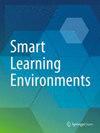The impact of high-immersion virtual reality on foreign language anxiety
IF 12.1
Q1 EDUCATION & EDUCATIONAL RESEARCH
引用次数: 16
Abstract
Abstract Public speaking, especially in a foreign language, is associated with increased anxiety. Research has shown the potential of virtual reality (VR) for simulating real-life experiences, allowing for public speaking practice in an ecological and safe environment. This between-subjects study investigated the effect of VR on foreign language anxiety (FLA) in public speaking practice. Intermediate learners of English participated in eight public speaking sessions over a three-month period, yielding 160 research observations. The experimental intervention took place in high-immersion VR with subjects wearing a VR headset and speaking in front of virtual audience. In the control intervention, subjects used a videoconferencing platform (Zoom) to speak in front of a real-life audience. Multivariate regression analysis revealed that practicing speaking in VR was associated with statistically significant lower FLA scores, compared with speaking practice using Zoom. The study found that VR technology had a positive effect on practicing public speaking in a foreign language. The research findings have practical implications for professionals and curriculum designers in various domains where public speaking skills are essential. For example, incorporating VR-based public speaking practice can benefit professionals preparing for a job interview, an elevator pitch, or a conference presentation. Curriculum designers can consider integrating VR simulations into language courses to provide students with realistic public speaking experiences. This approach can help students overcome language barriers, reduce anxiety, and develop their communication skills in a controlled and supportive environment.高沉浸虚拟现实对外语焦虑的影响
公开演讲,尤其是用外语演讲,与焦虑增加有关。研究表明,虚拟现实(VR)在模拟现实生活体验方面具有潜力,可以在生态和安全的环境中进行公开演讲练习。本研究旨在探讨虚拟现实对公开演讲练习中外语焦虑的影响。中级英语学习者在三个月的时间里参加了八次公开演讲,产生了160项研究观察结果。实验干预是在高度沉浸式虚拟现实中进行的,受试者戴着虚拟现实耳机,在虚拟观众面前说话。在控制干预中,受试者使用视频会议平台(Zoom)在现实生活中的观众面前发言。多元回归分析显示,与使用Zoom进行口语练习相比,在VR中练习口语与FLA分数有统计学意义的降低相关。研究发现,虚拟现实技术对练习用外语进行公开演讲有积极影响。研究结果对公共演讲技巧必不可少的各个领域的专业人士和课程设计师具有实际意义。例如,结合基于vr的公开演讲练习可以使专业人士为工作面试、电梯游说或会议演讲做准备。课程设计者可以考虑将VR模拟融入语言课程中,为学生提供真实的公开演讲体验。这种方法可以帮助学生克服语言障碍,减少焦虑,并在控制和支持的环境中发展他们的沟通技巧。
本文章由计算机程序翻译,如有差异,请以英文原文为准。
求助全文
约1分钟内获得全文
求助全文
来源期刊

Smart Learning Environments
Social Sciences-Education
CiteScore
13.20
自引率
2.10%
发文量
29
审稿时长
19 weeks
 求助内容:
求助内容: 应助结果提醒方式:
应助结果提醒方式:


